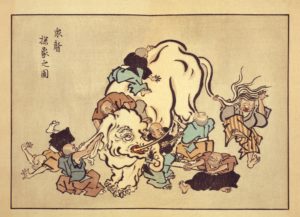
A case study in Wikipedia failure
by Dahlia Raven
 Alahverdian (right) with then-Governor Mike Pence in 2013 (from Wikimedia Commons)
Alahverdian (right) with then-Governor Mike Pence in 2013 (from Wikimedia Commons)
One of the most common criticisms of Wikipedia involves the inherent irresponsibility of letting “anyone” edit biographies on one of the world’s most-visited websites. This leads to vandalism, hatchet jobs, resume padding, political spin, and other undesired results. Whatever is in that biography is very likely to show as the first thing you see when you Google that person’s name. And not only is Wikipedia almost always the first result, but Google itself will show you a “knowledge panel” of facts (complete with picture), usually scraped from Wikipedia. If Wikipedia is wrong or if the Wikipedia entry had been vandalized when Google copied it, the damage is done without anyone even having to go to the Wikipedia article.
The Wikimedia Foundation (WMF) will tell you there are mechanisms in place to prevent this sort of thing from happening. This three-part case study will show you how those mechanisms are flawed, inadequate, misused, and open to being gamed.
Meet Nicholas Alahverdian
Nicholas Alahverdian is currently described in his Wikipedia biography as “an author, political scientist, whistleblower, and child welfare advocate.” His article is quite long and detailed, with an impressive 98 references. The article says that “the Associated Press and other news agencies confirmed that Alahverdian died on February 29, 2020.” (Newspapers don’t usually “confirm” that people have died, but they did indeed report his recent death.) Alahverdian was obviously known and respected in his native Rhode Island, since his passing was noted in the Rhode Island Senate and by proclamations from the mayors of multiple Rhode Island
…continue reading The Nicholas Alahverdian Story, Part One


